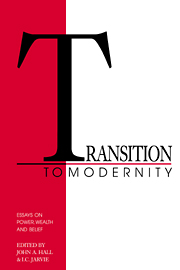Book contents
- Frontmatter
- Contents
- List of illustrations
- List of contributors
- Introduction
- PART I THE PRE-MODERN WORLD
- PART II TRANSITIONS TO THE MODERN WORLD
- PART III MODERNITY AND ITS DISCONTENTS
- 8 Science, politics, enchantment
- 9 Deconstructing post-modernism: Gellner and Crocodile Dundee
- 10 A methodology without presuppositions?
- 11 Gellner's positivism
- 12 Left versus Right in French political ideology
- 13 Property, justice and common good after socialism
- 14 Social contract, democracy and freedom
- 15 Thoughts on liberalisation
- 16 Peace, peace at last?
- Indexes
8 - Science, politics, enchantment
Published online by Cambridge University Press: 02 February 2010
- Frontmatter
- Contents
- List of illustrations
- List of contributors
- Introduction
- PART I THE PRE-MODERN WORLD
- PART II TRANSITIONS TO THE MODERN WORLD
- PART III MODERNITY AND ITS DISCONTENTS
- 8 Science, politics, enchantment
- 9 Deconstructing post-modernism: Gellner and Crocodile Dundee
- 10 A methodology without presuppositions?
- 11 Gellner's positivism
- 12 Left versus Right in French political ideology
- 13 Property, justice and common good after socialism
- 14 Social contract, democracy and freedom
- 15 Thoughts on liberalisation
- 16 Peace, peace at last?
- Indexes
Summary
The two addresses given by Max Weber on ‘Science as a Vocation’ and ‘Politics as a Vocation’ occupy a special position within his work. In a body of writing often cumbersome and diffuse, they stand out as masterpieces of literary economy and passion, sudden distillations in a few glowing pages from the sprawling mass of Weber's scholarly thought. Here the themes of rationalisation, religion, value-freedom, power, bureaucracy, charisma, ethical responsibility are all present, with a rhetorical intensity that has made these texts two of the most influential intellectual statements of this century. Yet it is as if their classical status has tended to shield them from close inspection. For beneath their surface clarity, each reveals signs of a turbulence that escapes logical control, generating a series of aporia which form a significant pattern.
Weber delivered his lecture on ‘Science as a Vocation’ on 7 November 1917, the day the Bolsheviks seized power in Russia. To his student audience in war-time Munich, he explained the sternness and strangeness of the scientific enterprise. Quite apart from its external drawbacks in the lottery of academic life, it afforded no inner satisfactions of a traditional sort either. Irremediably specialised, it excluded any possibility of general cognitive achievement; inherently impersonal, it forbade temperamental self-expression of the kind normal in art; perpetually developing, its progress ruled out any lasting achievement. Nor could it acquire meaning from any other sphere of life. For modern science had stripped the world of those fictive harmonies where it was once believed to be united to eternal truth, or to nature or divinity or happiness.
- Type
- Chapter
- Information
- Transition to ModernityEssays on Power, Wealth and Belief, pp. 187 - 212Publisher: Cambridge University PressPrint publication year: 1992
- 3
- Cited by

